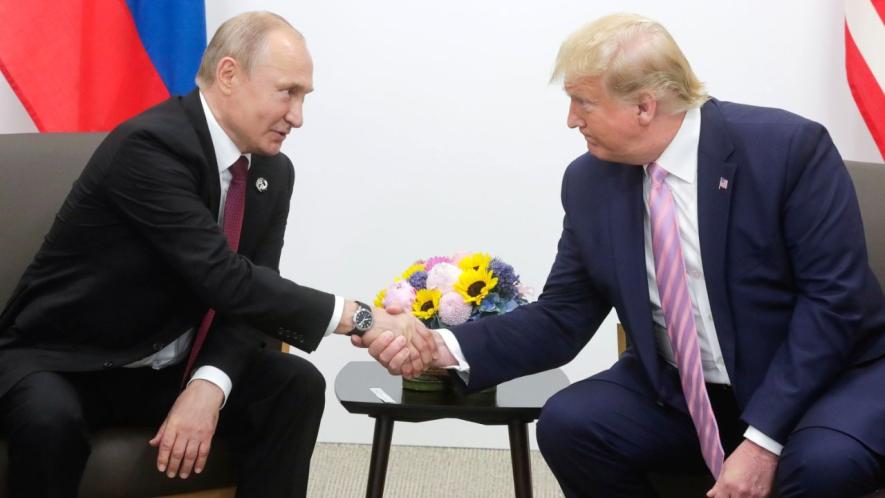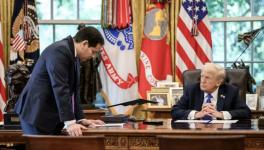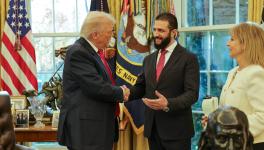Has Trump Broken Rules-Based Order or Exposed Its Weaknesses?

Vladimir Putin and Donald Trump. Image Courtesy: Wikimedia Commons
The so-called “rules-based international order” (RBIO) is often celebrated in mainstream discourse as the stabilising framework of the post-Second World War world, a benevolent architecture supposedly built by the United States to secure peace, prosperity, and multilateralism. In reality, this has always been more myth than truth. The RBIO was never about universal rules; it was about rules written and enforced by Washington in the interests of metropolitan capital, with US monopoly finance capital at its core.
For decades, this mythology was propped up by liberal intellectuals who claimed that US primacy was indispensable to democracy and global order. They wilfully ignored the genocidal history of the empire, particularly the record of US imperialism across the Americas and the Global South. Behind the rhetoric of “freedom” and “open markets” lay a system of structural violence, financial domination, and selective rules that secured the dominance of US capital while undermining the sovereignty of other nations.
Donald Trump didn’t destroy the RBIO, but his actions (in the context of the relative decline of US imperialist hegemony) ripped away what was left of its cosmopolitan (neo)liberal façade, showing it for what it always was: a system of mass violence, structural inequality, and selective “rules” enforced by and (mostly) for US monopoly capital.
The Architecture of Imperialist Hegemony
Cosmopolitan (neo)liberal institutionalist accounts speak of the work of the US government in the 1940s setting up the World Bank, International Monetary Fund (IMF) followed by the General Agreement on Tariffs and Trade (GATT) and the Marshall Plan. Why were these initiatives undertaken and how were they structured? Let us briefly consider each of them.
The World Bank and the IMF were set up to try and centre the international financial system around US monopoly capital whereby the US dollar initially linked legally to gold would be the international reserve currency. But the World Bank and IMF (in spite of their inclusive sounding names) are legally controlled by the US government through effectively veto powers.
Likewise, the GATT was an institution that mostly sought to achieve two goals: one, keep the diffusion of activities of all but the lower and lower middle reaches of the technological ladder that pertains to global production networks within the metropolis and invention principally within the US. Two, try to relatively isolate the Soviet Union and other socialist countries from trade and financial links with other capitalist countries.
The World Trade Organisation (WTO) which was established in the 1990s continued along the same trajectory as the GATT through an extension of labour arbitrage to select countries of the Global South in and around China. However, the US has recently been stymieing the functioning of WTO by refusing to appoint its representatives to the concerned Appellate Body since the US sees WTO as an obstacle in its attempts to contain China. In other words, WTO is also subject to the effective veto powers of the US.
During the Second World War, all the potential and actual rivals of the US were severely damaged, namely Germany, Japan, France and Britain on the one hand, and the Soviet Union and China on the other. The former four countries effectively became client states of the US, which allowed the Marshall Plan in Western Europe and an analogous initiative in East Asia (Japan, Taiwan, South Korea, Singapore and Hong Kong) to emerge since these were frontline areas in the Cold War against the socialist system.
In other words, greenfield foreign direct investment by US multinational corporations, market access to the US economy, selective technology transfer, limited redistributive land reform (in Japan, Taiwan and South Korea) etc., in these two areas were driven by these strategic objectives, which was codified in the propaganda sphere as alliances (client state relations). These alliances were also the means through which the US sought to militarily encircle its principal rivals, namely the Soviet Union and China.
Many (but not all) capitalist states in the Global South too ended up as allies (client states) of the US due to a combination of two factors: one, their perception that the US military umbrella was a necessary protection against the threat to themselves from socialism; two, their inability to mount even a modicum of resistance to US imperialist hegemony.
Other countries of the Global South, such as India, were able to bargain with both sides in the Cold War to obtain some concessions during the dirigiste stage of the capitalist system. However, the strategic discord between the Soviet Union and China strengthened US imperialist hegemony.
Read Also: Defending Sovereignty in New Trade War
Starting from the 1970s, the capitalist system transitioned from the dirigiste to the neo-liberal stages with a severe setback to the bargaining power of the working people. The eventual dissolution of the Soviet Union and the eclipse of the socialist experiments in Europe by 1991 inaugurated the unipolar moment that effectively ended by the 2010s.
During this time, the “Washington Consensus” was never a consensus at all; it was an imposition by metropolitan capital of deregulation, privatisation, trade liberalisation, and fiscal austerity as the only alternative economic trajectory in order to increase differentiated precarity and unemployment (involving a squeeze on the share of wages). All this while claiming that prosperity was right around the corner and in complete contradiction to the actual policy trajectories of the metropolitan countries themselves.
The much-celebrated openness of the RBIO was always conditional and operating on its “right” side required acceptance of asymmetrical rules written to preserve US imperialist hegemony.
Trump Exposes the Reality of RBIO
Prior to Trump, US presidents, more often than not, cloaked their agenda of imperialist hegemony in lofty language that presented the ideas expressed by Samuel P Huntington, Zbigniew Brzezinski and others without much of the warts. This is analogous to those apologists of colonialism who claim that this process ostensibly crafted modern concepts like the rule of law even when presiding over the most extensive genocide in human history. The working of rule of law and the RBIO cannot be practically separated from the strategic power (class) relations in international and domestic political economies.
Trump’s Make America Great Again agenda is a break primarily with the wordplay of the cosmopolitan neo-liberals while the basic agenda of trying to retain US imperialist hegemony continues.
But Trump is facing a world where: one, the rise of China and the return of Russia and the strategic concord between the two (that has furthered a tendency toward strategic autonomy worldwide) have fundamentally undermined this imperialist hegemony.
Two, the differential squeeze on different segments of the working people notwithstanding, the fall in the share of wages worldwide has given rise to an overproduction crisis.
Three, even denizens of metropolitan capital have become (at least partially) aware of this diminishment of US imperialist hegemony which has adverse implications for the international reserve currency status of the US dollar.
Trump’s “brashness” has involved the wielding of the tools that the RBIO had always offered to the hegemon but in ways that made this hegemony starkly explicit while it was somewhat implicit previously. In other words, the component of “consent” in this hegemony under whose cloak US monopoly capital pressured ruling classes of other countries without making them look excessively weak before their own working people, has now been torn down by Trump.
Why is Trump being “brash”? Before answering this question, it is necessary to ask the following: who is Trump being “brash” with? The answer being most countries except China and Russia, since each of them separately and especially both working together have strategic leverage of a magnitude that Trump and the US cannot contend with successfully.
But is it not strategically gauche for Trump to antagonise a whole host of countries (other than China and Russia), especially when these other countries could be potentially useful allies against China and Russia? However, many of these countries are also aware that US imperialist hegemony has diminished and are, therefore, chary of being part of a US-led process of strategically isolating China.
Read Also: BRICS: Political Economy & Quest for Systemic Alternatives
The strategic outreach to Russia by Trump is a desperate move to try and drive a wedge between China and Russia. But it is unlikely to succeed since the fulfilment of Russian strategic demands in Europe that will actualise this wedge are likely to be incompatible with the persistence of US hegemony in Europe.
Moreover, and as previously indicated, denizens of metropolitan capital, including international rentiers, are no longer fully confident that international trade and finance will be centred around the US dollar. Therefore, it is no longer possible for the US economy to have its trade deficit readily financed by lending at relatively low rates of interest by the rest of the world.
Consequently, in response to calls by international rentiers to cap the US fiscal deficit (and therefore its) trade deficit, the US is seeking to reduce its trade deficit with as many countries as possible. Ironically, this may backfire, with these countries seeking to develop closer economic (and more broadly strategic) ties with China and the BRICS.
What the Cosmopolitan (Neo)Liberal Story Misses
Cosmopolitan (neo)liberals, including some in the Global South, often hark back to this mythical pre-Trump world where there existed a tolerably benign system (especially relative to their alternative). They fail to grasp or conceal the fact that US imperialist hegemony was hardwired into the RBIO from the start.
By focusing narrowly on the letter (texts and wordplay) of international relations under the RBIO, they miss or cover up the role of metropolitan capital’s hegemony over the Global South. In fact, the principal grouse that cosmopolitan neo-liberals (some of whom moonlight as neo-fascists) have regarding Trump’s “brashness” is that the reality of their being subject to US imperialist hegemony is becoming more transparent in ways that may pose challenges to the domestic hegemony of ruling classes in the Global South.
Sometimes, cosmopolitan neo-liberals suggest that the optimal strategy for countries of the Global South is to wait out the second Trump presidency that will end in a few years and hope to return to the purported pre-Trump RBIO. The appendix to this stated position is that countries in the Global South should not seek to work toward authentic alternatives to the RBIO.
This position of the cosmopolitan neo-liberals is profoundly mistaken at a number of levels. One, and as argued previously, the RBIO is synonymous with US imperialist hegemony.
Two, waiting out Trump is irrational since the principal driver of US policy (namely the attempts to counter the diminishment of US imperialist hegemony) will also outlast Trump.
Three, the failure to work toward the constitution of authentic alternatives to the RBIO will end up relatively strengthening US imperialist hegemony.
Conclusion
The US, whether led by Trump or any other leader will try to prolong for as possible the tenure of a weakening RBIO or its equivalent by any other name, which will have adverse consequences for world peace. Disavowing cosmopolitan neo-liberal tropes is a necessary condition toward the crafting of an alternative to RBIO.
A democratisation of international political economy requires the end of RBIO. Only a multipolar world where strategic power is less concentrated globally can be a reliable foundation on which quests for comprehensive democratic transformation can take place on a sustainable basis.
Shirin Akhter is Associate Professor at Zakir Husain Delhi College, University of Delhi. C Saratchand is Professor, Department of Economics, Satyawati College, University of Delhi. The views are personal.
Get the latest reports & analysis with people's perspective on Protests, movements & deep analytical videos, discussions of the current affairs in your Telegram app. Subscribe to NewsClick's Telegram channel & get Real-Time updates on stories, as they get published on our website.
























